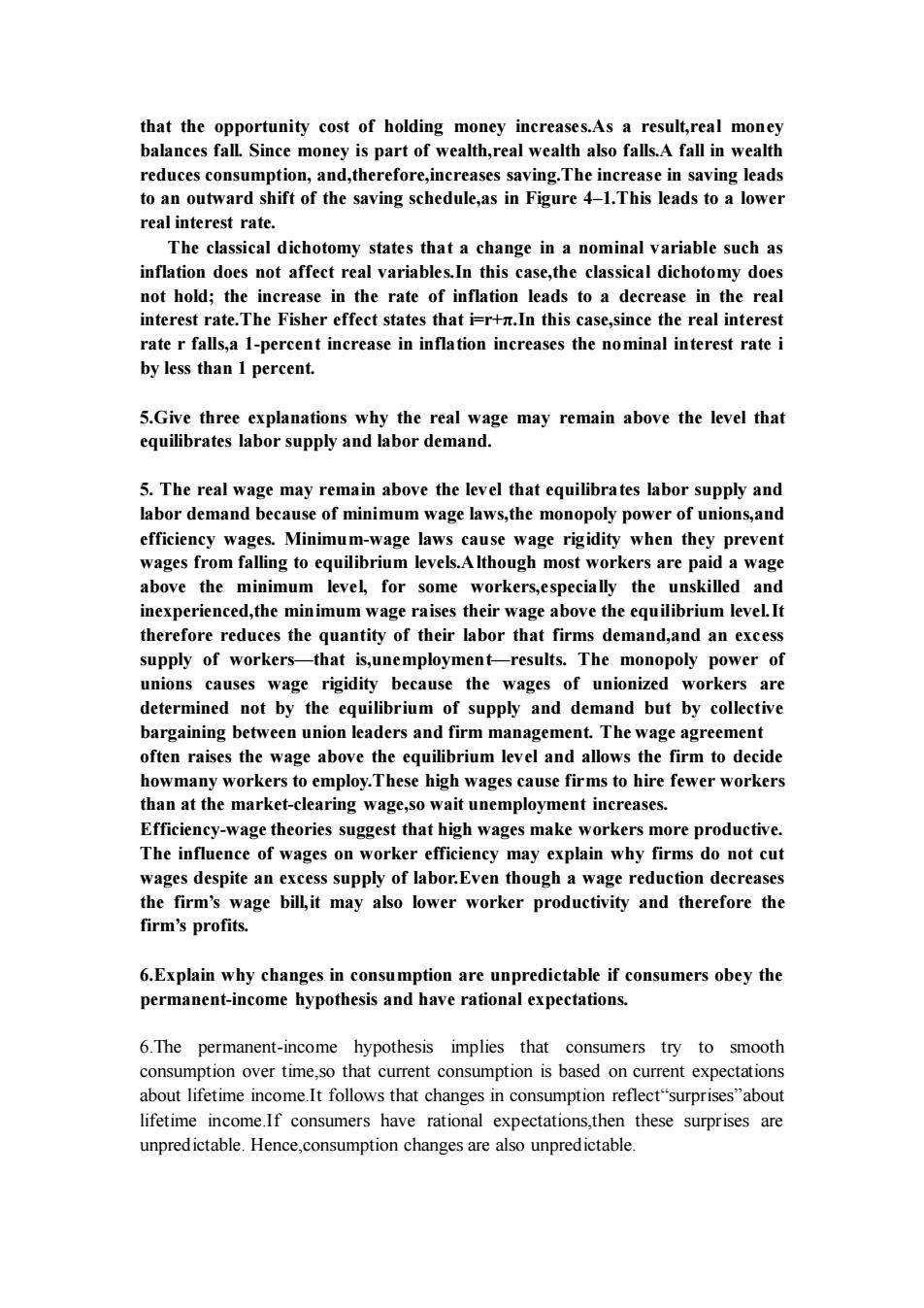正在加载图片...

that the opportunity cost of holding money increases.as a result.real money balances fal.Since money s part of wealth,real wealth also falls.A fall in wealth reduces consumption,and,therefore,increases saving.The increa in saving lead to an outward shift of the saving schedule,as in Figure 4-1.This leads to a lower real interest rate. The classical dichotomy states that a change in a nominal variable such as inflation does not affect eal variables.In this case,the classical dichotomy does not hold;the the rate of inflatio to a d cre se in the real interest rate.The Fisher effect states that i=r+n.In this case,since the real interest rate r falls.a 1-percent increase in inflation increases the nominal interest rate i by less than 1 percent. 5.Give three quilibrates labor supply and may remain above the level f 5.The real wage may remain above the level that equilibrates labor supply and labor demand because of minimum wage laws,the monopoly power of unions,and es.Minimu law age rigidi when they prevent wages from falling to cquilibrium levels.Although most workers are paid awag above the minimum level,for some workers,especially the unskilled and inexperienced,the minimum wage raises their wage above the equilibrium level.It therefore reduces the quantity of their labor that firms demand,and an excess supply of workersthat employment-results.The opoly power of unions cause wage rigidity because the wages of unio orkers determined not by the equilibrium of supply and demand but by collective bargaining between union leaders and firm management.The wage agreement often raises the wage above the equilibrium level and allows the firm to decide howmany workers to employ.These high wages cause firms to hire fewer workers than at the e m rket-clearing wage. wait unemplo rease Efficiency-wage theories suggest that high wages make workers more productive The influence of wages on worker efficiency may explain why firms do not cut wages despite an excess supply of labor.Even though a wage reduction decreases the firm's wage bill,it may also lower worker productivity and therefore the firm's profits. 6.Explain why changes in consumption are unpredictable if consumers obey the permanent-income hypothesis and have rational expectations. 6.The permanent-income hypothesis implies that consumers try to smooth over tim 、hal consumption is based expect ion about lifetime income.It follows that changes in consumption"about lifetime income.If consumers have rational expectations,then these surprises are unpredictable.Hence,consumption changes are also unpredictable. that the opportunity cost of holding money increases.As a result,real money balances fall. Since money is part of wealth,real wealth also falls.A fall in wealth reduces consumption, and,therefore,increases saving.The increase in saving leads to an outward shift of the saving schedule,as in Figure 4–1.This leads to a lower real interest rate. The classical dichotomy states that a change in a nominal variable such as inflation does not affect real variables.In this case,the classical dichotomy does not hold; the increase in the rate of inflation leads to a decrease in the real interest rate.The Fisher effect states that i=r+π.In this case,since the real interest rate r falls,a 1-percent increase in inflation increases the nominal interest rate i by less than 1 percent. 5.Give three explanations why the real wage may remain above the level that equilibrates labor supply and labor demand. 5. The real wage may remain above the level that equilibrates labor supply and labor demand because of minimum wage laws,the monopoly power of unions,and efficiency wages. Minimum-wage laws cause wage rigidity when they prevent wages from falling to equilibrium levels.Although most workers are paid a wage above the minimum level, for some workers,especially the unskilled and inexperienced,the minimum wage raises their wage above the equilibrium level.It therefore reduces the quantity of their labor that firms demand,and an excess supply of workers—that is,unemployment—results. The monopoly power of unions causes wage rigidity because the wages of unionized workers are determined not by the equilibrium of supply and demand but by collective bargaining between union leaders and firm management. The wage agreement often raises the wage above the equilibrium level and allows the firm to decide howmany workers to employ.These high wages cause firms to hire fewer workers than at the market-clearing wage,so wait unemployment increases. Efficiency-wage theories suggest that high wages make workers more productive. The influence of wages on worker efficiency may explain why firms do not cut wages despite an excess supply of labor.Even though a wage reduction decreases the firm’s wage bill,it may also lower worker productivity and therefore the firm’s profits. 6.Explain why changes in consumption are unpredictable if consumers obey the permanent-income hypothesis and have rational expectations. 6.The permanent-income hypothesis implies that consumers try to smooth consumption over time,so that current consumption is based on current expectations about lifetime income.It follows that changes in consumption reflect“surprises”about lifetime income.If consumers have rational expectations,then these surprises are unpredictable. Hence,consumption changes are also unpredictable